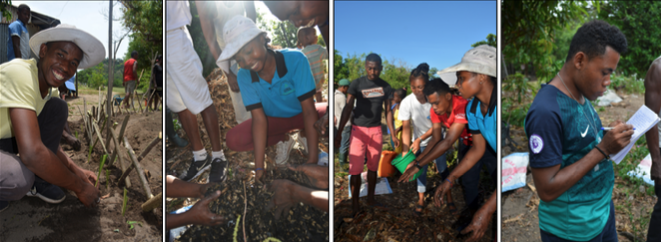DLC-SAVA Conservation forging new collaborations with CURSA, the university of SAVA region: Agroecology workshops
By James Herrera, Program Coordinator, DLC-SAVA Conservation
My next opportunity to engage with CURSA students and the faculty was during the first DLC-SAVA sustainable agriculture training in the District of Antalaha. During one week, five students took part in a workshop with 15 farmers at the village of Ampahana. The NGO Terra Firma, International and DLC-SAVA Conservation led a training program in agroecology, to create a permanent garden with soils that were amended with compost and organic methods.

CURSA students participating in the DLC-SAVA/Terra Firma International agroecology workshop in November 2019. Five students participated in hands-on skills development. These students were not shy about getting their hands dirty and integrated seamlessly with the 15 local farmers who hosted us in their community. CURSA Director Christophe and teacher Fulgence came to visit to see the results of the workshop. DLC-SAVA Conservation Coordinator Charlie Welch also took part, and this vertically integrated team put their heads and hands together to teach transferable skills in agroecology.
Living together in the home of one of our workshop participants, we had a lot of time to get to know each other. The students took full advantage of the opportunities with Terra Firma educator Peter Jensen. He shared 30+ years of experience teaching about sustainable agriculture in settings all over Africa such as Ethiopia, Sudan, Tanzania, Uganda, and Rwanda. The students asked about how best to design farms given the types of land their families own. They also asked about how to design research to answer questions related to agronomy, especially best organic fertilizers for amending soils, and how to manage pests without using harmful chemicals.

The students were never afraid to dig their hands into the dirt and compost, and were studious throughout, filling notebooks whenever they weren’t digging and planting.
After a week of reviewing what they had learned, the students gave a PowerPoint presentation for the DLC-SAVA staff and Terra Firma educators, open to the university. All the attendants asked in-depth questions about why they chose the materials they did for amending soils, especially related to composting. They were also intrigued by the focus on local products, and that no farming inputs were purchased or brought in from outside. This was a welcome relief from the common sales pitch for inorganic fertilizers or pesticides, or even organic compost available from bat guano which is expensive. As CURSA plans to develop an Agronomy discipline at the university, these experiences and future collaborations with DLC-SAVA will help create the curriculum that will teach future classes about sustainable agricultural intensification.
In July 2020, these students helped co-host follow-up workshops at each of three villages to reinforce key techniques. Students are helping to build on our six months of evaluations to further refine the skills of participants, strengthening their capacity to develop productive home gardens with nutrient dense foods.

Students gave presentations for the university, DLC-SAVA, and Terra Firma. Peter Jensen, who has trained dozens of rural communities in agroecology methods, said that this was the first time he had a group present the methods to him and demonstrate their understanding like this.
In the next part of the series, you’ll hear more about reforestation activities with CURSA, the local government, and local communities. Stay tuned. All the photo credits in this part go to DLC-SAVA Liaison, Laura De Ara – thank you for always capturing these memories!
A three-part series
Part I: Conservation Workshop in Marojejy National Park
Part II: Agroecology Workshops
Part III: Community Building at Local Tree Nursery

